Emergency HVAC Thornton
Find After Hours HVAC in Thornton
Get multiple Emergency HVAC Service quotes for your project today! Compare profiles, reviews, accreditations, portfolio, etc... and choose the best service.
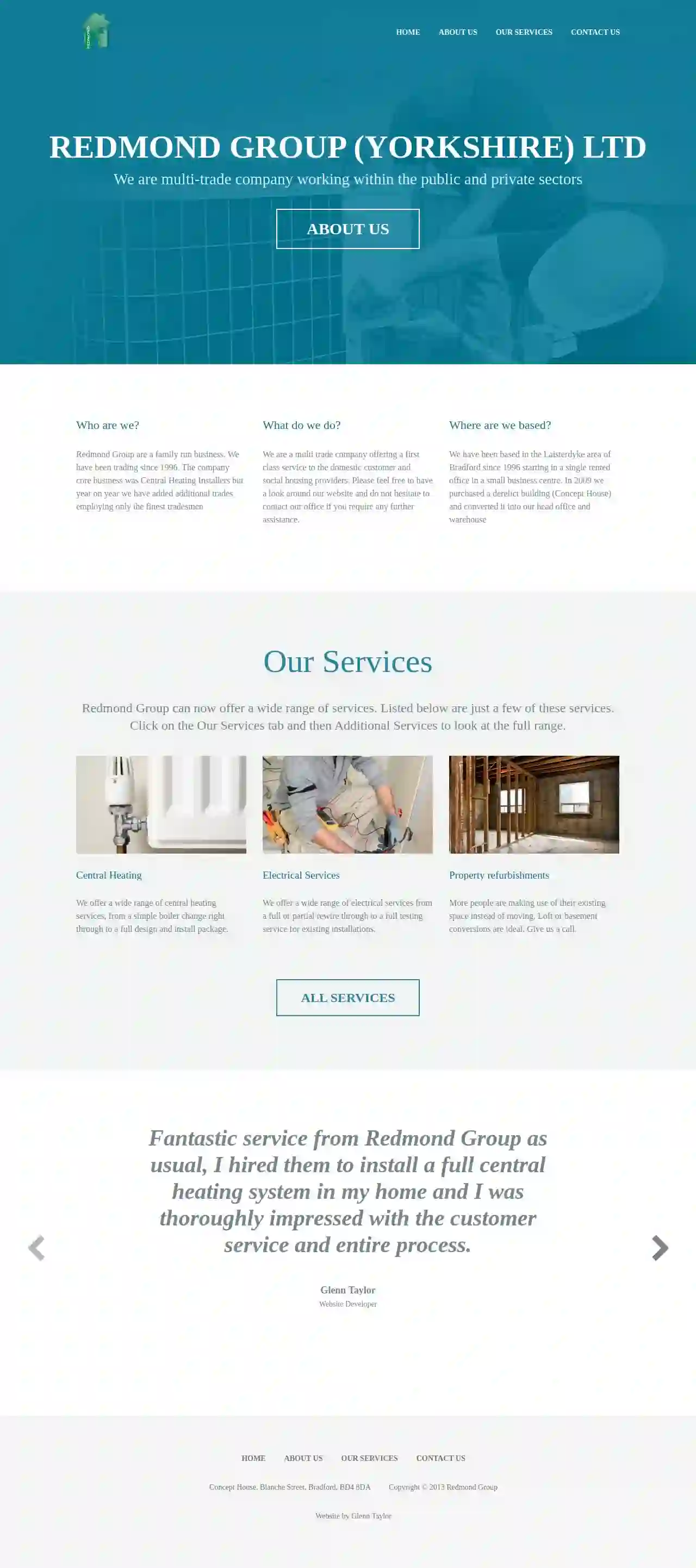
Redmond Group Ltd
3.73 reviewsConcept House, Blanche Street, Bradford, BD4 8DA, GBRedmond Group is a family run business with over 25 years of experience in the plumbing, heating and gas industries. We are a multi-trade company offering a wide range of services, including central heating, electrical services, and property refurbishments. Our team of experienced tradesmen are dedicated to providing a first-class service to both domestic and commercial customers. We are based in Bradford, West Yorkshire, and have been serving the local community since 1996.
- Services
- Why Us?
- Accreditations
- Our Team
- Testimonials
- Gallery
Get Quote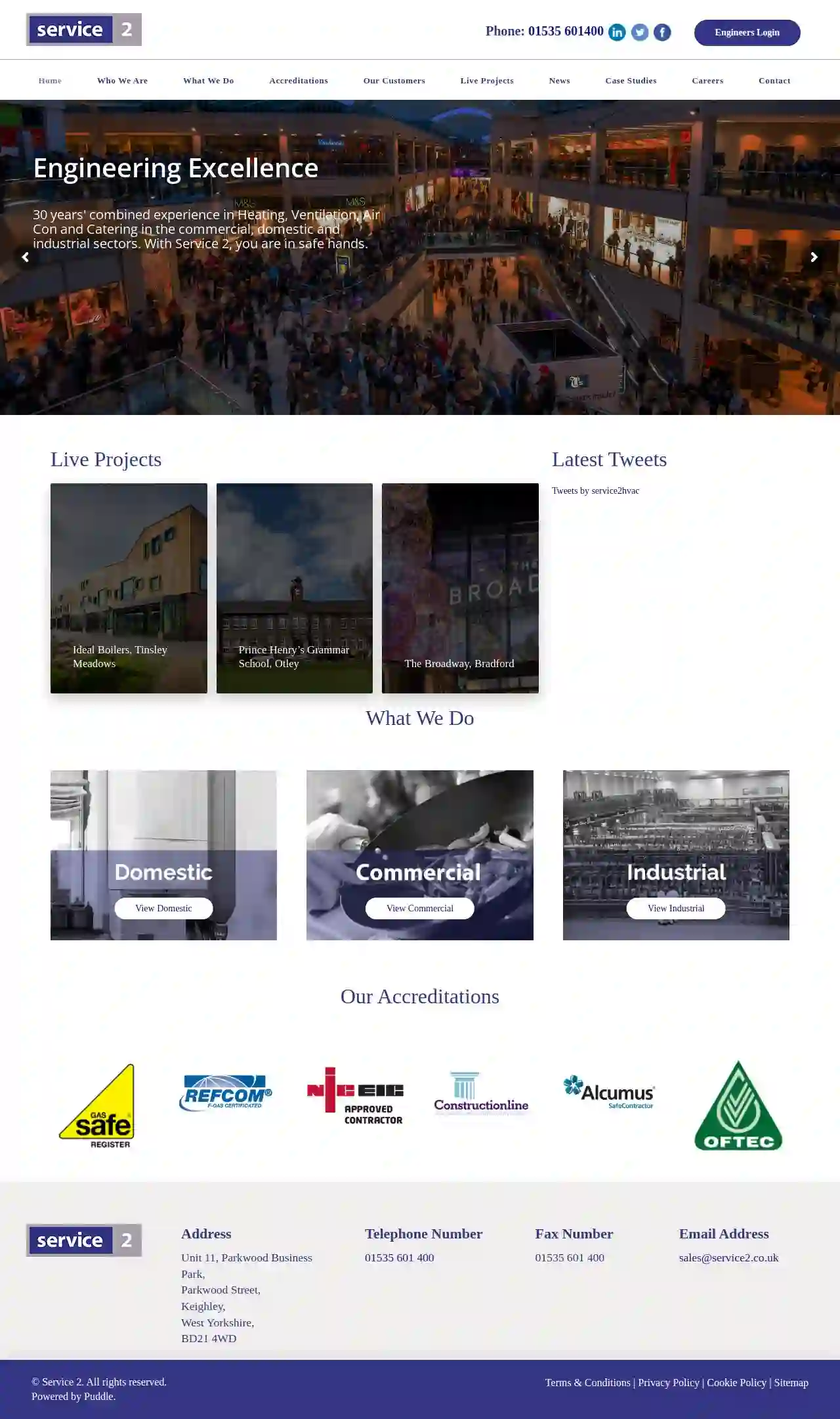
Service 2 (HVAC) Limited
Parkwood Street, Unit 11, Parkwood Business Park, Keighley, BD21 4WD, GBWelcome to the home of Service 2. How can we help you? We are proud to be the service provider of choice for national brands like Marriot, BUPA, Burger King and DFS. Our team of expert engineers provide nationwide planned and reactive service and maintenance 24 hours a day, 365 days a year. With 30 years' combined experience in Heating, Ventilation, Air Con and Catering in the commercial, domestic and industrial sectors. With Service 2, you are in safe hands.
- Services
- Why Us?
- Accreditations
- Gallery
Get Quote
Bradford Boiler Installation Company - Service & Repairs
5200 reviewsBradford, West Yorkshire, Pullan Avenue, BD2 3RN, GBBradford Boiler Company provides high-quality Combi boiler installations, boiler Servicing and Boiler Repairs. We are Worcester Bosch Accredited Installers and Navien approved service Agents. Our team of experienced engineers are Gas Safe registered and provide a top-quality service for each and every customer. We always strive to provide a smooth process and take away all our rubbish and the old boiler. We are a local business, always giving our customers the best price. We take care of your new boiler, with our knowledge and experience, you are in safe hands.
- Services
- Why Us?
- Accreditations
- Our Team
- Testimonials
- Gallery
Get Quote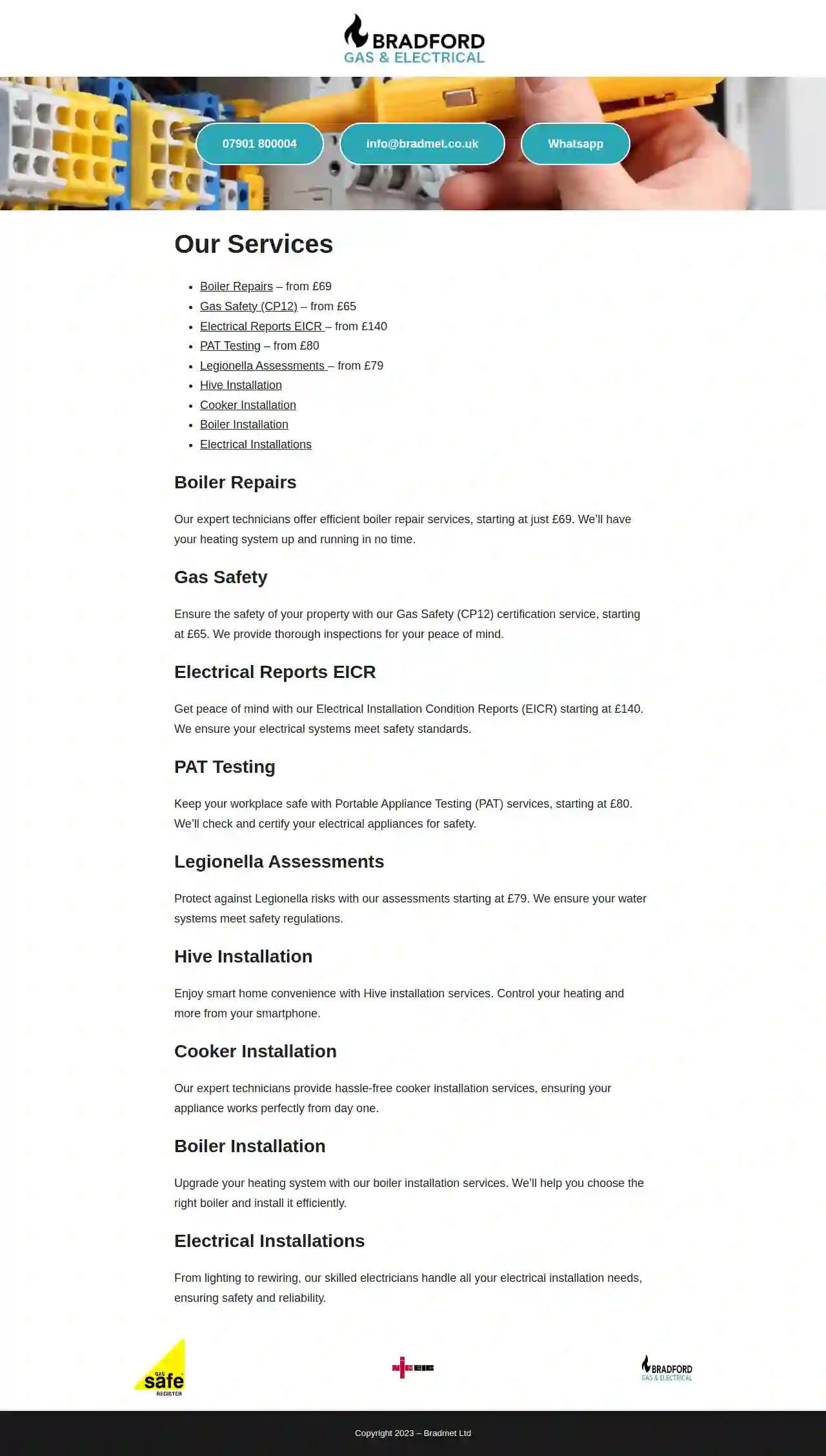
Bradford Gas & Electrical
552 reviewsBradford, GBBradmet Ltd is a reputable company providing a range of services including boiler repairs, gas safety certificates, electrical reports, PAT testing, legionella assessments, and more. With expert technicians and a commitment to safety, they ensure your heating system is up and running efficiently. Additionally, they offer smart home convenience with Hive installation, hassle-free cooker installation, and boiler installation services. Their skilled electricians handle all electrical installation needs, ensuring safety and reliability. Copyright 2023 – Bradmet Ltd.
- Services
- Why Us?
- Gallery
Get Quote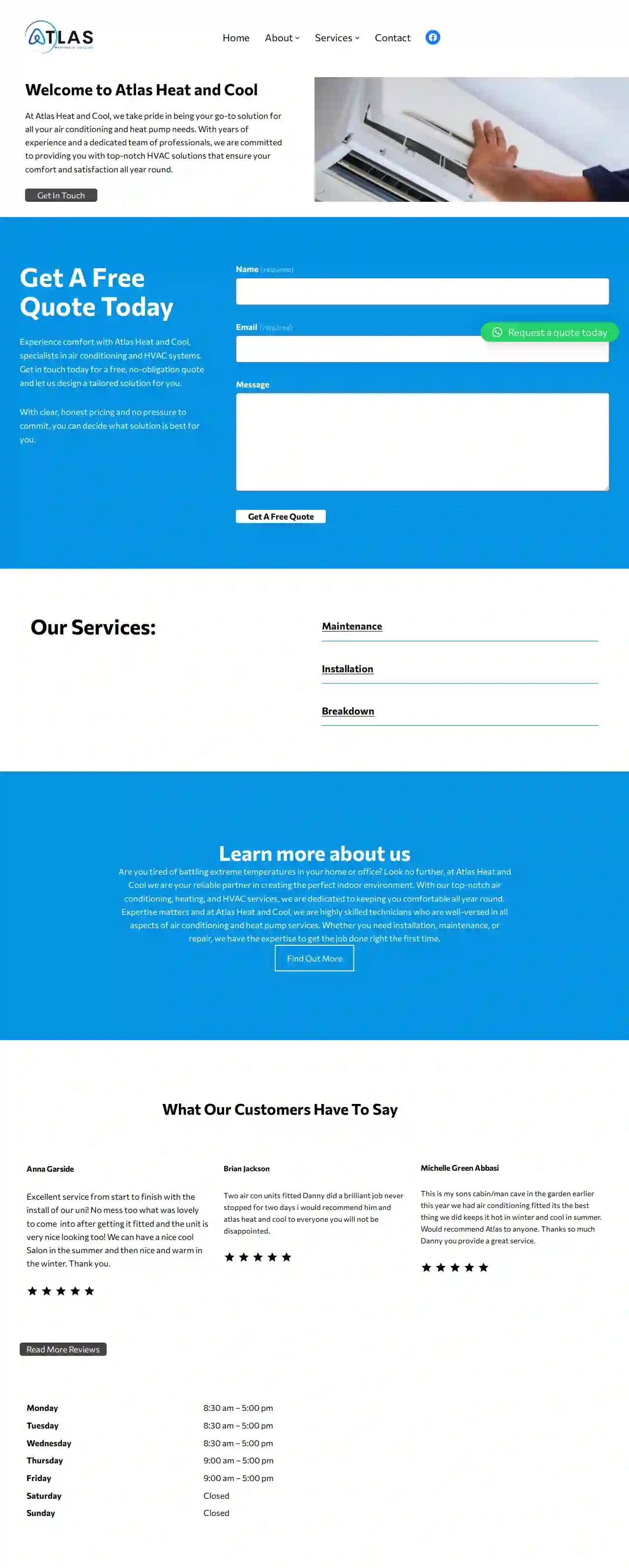
Atlas Air Conditioning
4.842 reviewsBradford, GBAt Atlas Heat and Cool, we take pride in being your go-to solution for all your air conditioning and heat pump needs. With years of experience and a dedicated team of professionals, we are committed to providing you with top-notch HVAC solutions that ensure your comfort and satisfaction all year round. Experience comfort with Atlas Heat and Cool, specialists in air conditioning and HVAC systems. Get in touch today for a free, no-obligation quote and let us design a tailored solution for you.
- Services
- Why Us?
- Testimonials
- Gallery
Get Quote
ECS Commissioning | HVAC Testing and Commissioning
Keighley, GBSince our incorporation in 2008, we have been trusted by and delivered for some of the most recognisable names in the marketplace. Our HVAC Testing and Commissioning service takes your installation from the stage of static completion to full working order to the agreed specified requirements. We are experts in understanding client and project requirements of varying sizes and industries and we tailor our services to reflect this. We are a small but highly skilled and experienced team. This enables us to build trusted and long lasting relationships with clients, be flexible and to provide solutions within budget without ever compromising on quality.
- Services
- Why Us?
- Testimonials
- Gallery
Get Quote
H2Heat Ltd
519 reviewsEast Morton, GBWe have over 25 years’ experience providing professional heating & plumbing services across East Morton and surrounding areas. I offer you the highest quality workmanship and services. My reputation has been developed through hard work and reliability which is why I am one of the area’s preferred choices for heating services, for more information please get in touch.
- Services
- Why Us?
- Accreditations
- Our Team
- Testimonials
- Gallery
Get Quote
Calderbank Heating
554 reviews2500 Castle Dr, Manhattan, NY, Unit 345, GBCalderbank Heating Ltd is a modern business with traditional values. We believe that respectfully working in a customer's home is a privilege and getting to do what we love each day is a real win for both me and my clients. Our highly knowledgeable and experienced heating engineer, Alec, is dedicated to providing excellent service and ensuring that our customers receive the best possible solution for their heating needs. With over 20 years of experience, Alec has built a reputation for being a trustworthy and reliable heating engineer. We pride ourselves on our commitment to providing high-quality work, excellent communication, and a friendly and professional approach. We are accredited with several manufacturers, including Viessmann, Worcester Bosch, Vaillant, Ideal, Baxi, and Intergas. Our services include boiler installations, servicing, and repairs, as well as heating health checks and energy efficiency assessments. We are passionate about reducing heating costs and emissions, and we strive to provide our customers with the best possible solution for their heating needs.
- Services
- Why Us?
- Accreditations
- Our Team
- Testimonials
- Gallery
Get Quote
2nd Generation HVAC
526 reviews123 Main St, Garden City, 11554, GBAt 2nd Generation HVAC, we pride ourselves on providing top-notch heating and cooling services to our customers in the greater New York area. With over 20 years of experience, our team of experts is dedicated to delivering exceptional results and unparalleled customer service. We understand the importance of a comfortable and energy-efficient home, which is why we offer a wide range of services, from routine maintenance to emergency repairs. Our goal is to build long-lasting relationships with our customers, and we strive to exceed their expectations with every interaction.
- Services
- Why Us?
- Accreditations
- Our Team
- Testimonials
Get Quote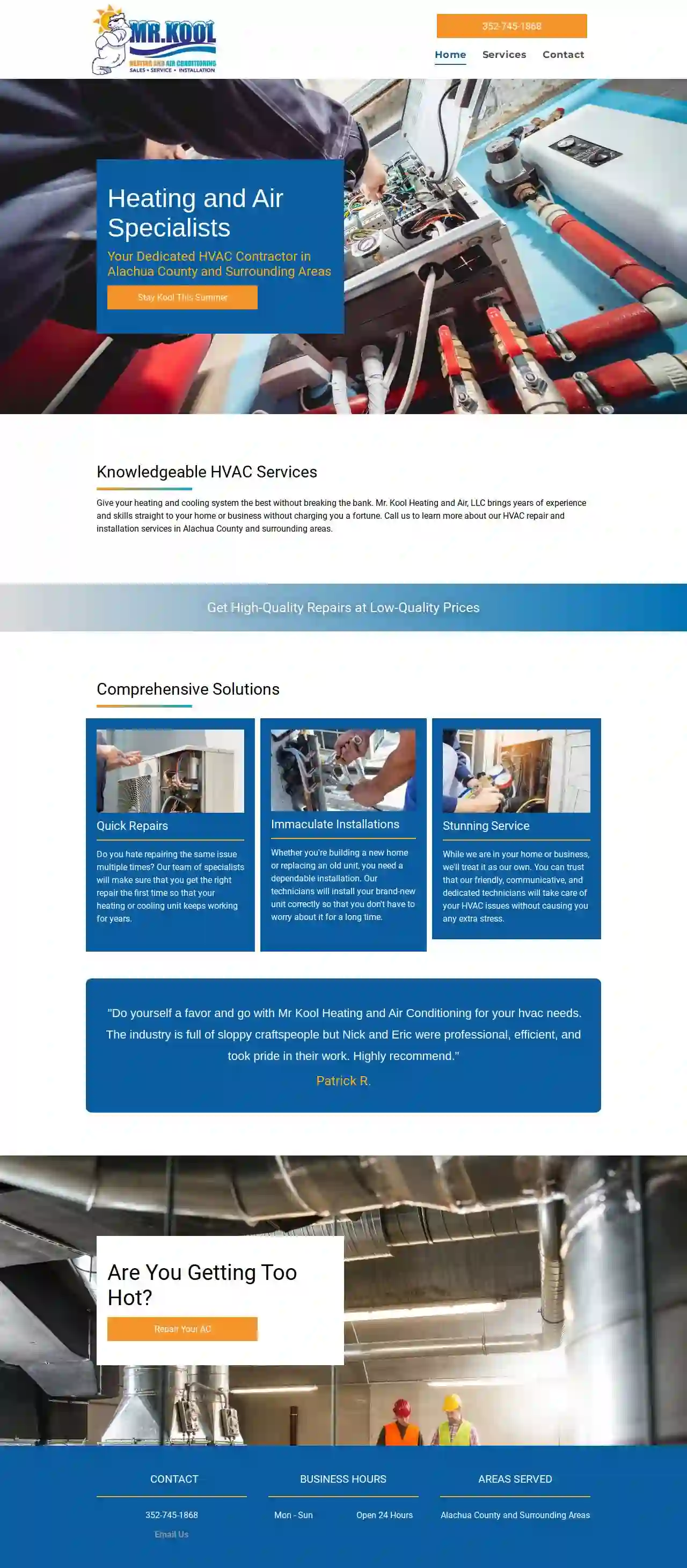
Mr. Kool Heating and Air, LLC
540 reviewsAlachua, GBMr. Kool Heating and Air, LLC is a dedicated HVAC contractor serving Alachua County and surrounding areas. With years of experience and skills, we bring high-quality repairs and installations to your home or business without breaking the bank. Our team of specialists is knowledgeable and friendly, providing comprehensive solutions for all your HVAC needs. Whether you need a new system or a repair, we're available 24/7 to take care of it the first time. We're proud of our reputation for being professional, on-time, and reasonably priced, with a focus on customer satisfaction.
- Services
- Why Us?
- Our Team
- Testimonials
- Gallery
Get Quote
Over 12,692+ HVAC Businesses on our platform
Our HVAC companies operate in Thornton and surrounding areas!
HVACCompaniesHub has curated and vetted the Best HVAC Contractors in Thornton. Find a trustworthy business today.
Frequently Asked Questions About Emergency HVAC Services
- Change or clean air filters every 1-3 months.
- Clear debris from around the outdoor unit.
- Check and clean the evaporator coil (if accessible).
- Inspect refrigerant lines for leaks.
- Improve Energy Efficiency
- Extend System Lifespan
- Prevent Costly Repairs
- Enhance Indoor Air Quality
- Identify Potential Problems Early
- Ensure System Reliability
How long does it take for an emergency HVAC technician to arrive?
How do I maintain my air conditioner?
How do I find an emergency HVAC technician near me?
What are the benefits of a preventative HVAC maintenance plan?
How long does it take for an emergency HVAC technician to arrive?
How do I maintain my air conditioner?
- Change or clean air filters every 1-3 months.
- Clear debris from around the outdoor unit.
- Check and clean the evaporator coil (if accessible).
- Inspect refrigerant lines for leaks.
How do I find an emergency HVAC technician near me?
What are the benefits of a preventative HVAC maintenance plan?
- Improve Energy Efficiency
- Extend System Lifespan
- Prevent Costly Repairs
- Enhance Indoor Air Quality
- Identify Potential Problems Early
- Ensure Safe and Reliable Operation